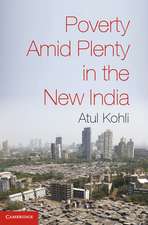The Politics of Advanced Capitalism
Editat de Pablo Beramendi, Silja Häusermann, Herbert Kitschelt, Hanspeter Kriesien Limba Engleză Paperback – 22 apr 2015
| Toate formatele și edițiile | Preț | Express |
|---|---|---|
| Paperback (1) | 345.73 lei 6-8 săpt. | |
| Cambridge University Press – 22 apr 2015 | 345.73 lei 6-8 săpt. | |
| Hardback (1) | 706.05 lei 6-8 săpt. | |
| Cambridge University Press – 26 apr 2015 | 706.05 lei 6-8 săpt. |
Preț: 345.73 lei
Nou
Puncte Express: 519
Preț estimativ în valută:
66.16€ • 69.21$ • 54.96£
66.16€ • 69.21$ • 54.96£
Carte tipărită la comandă
Livrare economică 02-16 aprilie
Preluare comenzi: 021 569.72.76
Specificații
ISBN-13: 9781107492622
ISBN-10: 1107492629
Pagini: 471
Ilustrații: 62 b/w illus. 47 tables
Dimensiuni: 152 x 229 x 25 mm
Greutate: 0.64 kg
Editura: Cambridge University Press
Colecția Cambridge University Press
Locul publicării:New York, United States
ISBN-10: 1107492629
Pagini: 471
Ilustrații: 62 b/w illus. 47 tables
Dimensiuni: 152 x 229 x 25 mm
Greutate: 0.64 kg
Editura: Cambridge University Press
Colecția Cambridge University Press
Locul publicării:New York, United States
Cuprins
1. Introduction: the politics of advanced capitalism Pablo Beramendi, Silja Häusermann, Herbert Kitschelt and Hanspeter Kriesi; Part I. Structural Transformations: 2. Prosperity and the evolving structure of advanced economies Carles Boix; 3. The origins of dualism David Rueda, Erik Wibbels and Melina Altamirano; 4. Occupational structure and labor market change in Western Europe since 1990 Daniel Oesch; 5. Globalization, labor market risks, and class cleavage Rafaela Dancygier and Stefanie Walter; 6. The return of the family Gosta Esping-Andersen; Part II. Politics: 7. Party alignments: change and continuity Herbert Kitschelt and Philipp Rehm; 8. What do voters want? Dimensions and configurations in individual-level preferences and party choice Silja Häusermann and Hanspeter Kriesi; 9. Trade unions and the future of democratic capitalism Anke Hassel; Part III. Policies: 10. Post-industrial social policy Evelyne Huber and John Stephens; 11. The dynamics of social investment: human capital, activation, and care Jane Gingrich and Ben Ansell; 12. Stability and change in CMEs: corporate governance and industrial relations in Germany and Denmark Gregory Jackson and Kathleen Thelen; Part IV. Outcomes: 13. Constrained partisanship and economic outcomes Pablo Beramendi; 14. Happiness and the welfare state: decommodification and the political economy of subjective wellbeing Christopher J. Anderson and Jason D. Hecht; 15. Conclusion: advanced capitalism in crisis Pablo Beramendi, Silja Häusermann, Herbert Kitschelt and Hanspeter Kriesi.
Recenzii
'This book offers the most compelling single-volume treatment to date of the evolution of advanced democratic capitalism and its subtypes. It provides state-of-the-art analysis of the character of postindustrial changes, their impact on cleavages and citizen preferences, and how parties fashion winning postindustrial political coalitions behind particular paths of adjustment. In doing so, Beramendi and colleagues reject functionalist and structuralist explanations of contemporary change and highlight the centrality of coalition building, partisan competition, and electoral politics for understanding the trajectories of advanced nations. The book concludes with an insightful examination of the consequences of particular paths of postindustrial policy adaption for economic outcomes, equality, and life satisfaction as well as the impact of recent economic crises on advanced capitalism. It is a superb contribution.' Duane Swank, President of the APSA Organized Section on Comparative Politics, Marquette University, Wisconsin
'An excellent contribution to the important topic of comparing country responses to the economic turbulences of recent times: how models about power resources, path dependence, and power alignments can make senses out of divergence/convergence on inequality, unemployment, growth, mobility, gender, health, and education. Faced with the decline of manufacturing, the globalization of the supply chain, and the shrinking of low-wage manufacturing, countries use their investments in the various institutions of capitalism in differing ways. This book helps us understand this variance and is valuable for faculty and students alike.' Peter Gourevitch, School of International Relations and Pacific Studies, University of California, San Diego
'An excellent contribution to the important topic of comparing country responses to the economic turbulences of recent times: how models about power resources, path dependence, and power alignments can make senses out of divergence/convergence on inequality, unemployment, growth, mobility, gender, health, and education. Faced with the decline of manufacturing, the globalization of the supply chain, and the shrinking of low-wage manufacturing, countries use their investments in the various institutions of capitalism in differing ways. This book helps us understand this variance and is valuable for faculty and students alike.' Peter Gourevitch, School of International Relations and Pacific Studies, University of California, San Diego
Descriere
This book takes stock of the major economic and political challenges advanced capitalist democracies face today.






















